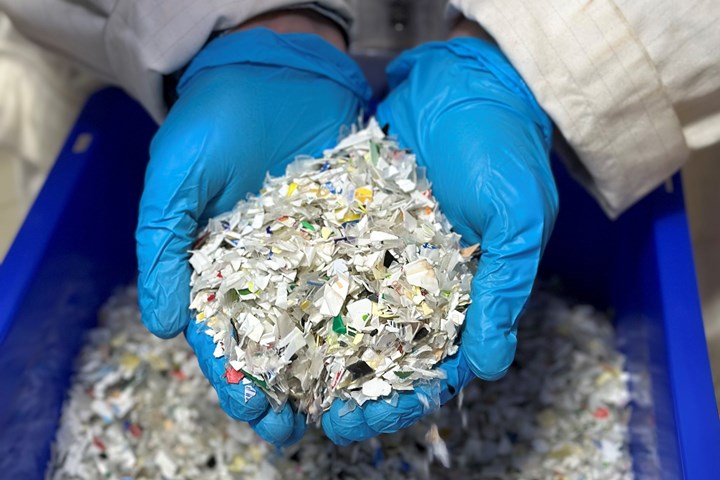Research Project Probes Potential for AI-based Sorting in Postconsumer Polypropylene
Process couples vision-based sorting with efficient decontamination to separate high-value PP.
Project OMNI, a collaborative research program directed by , and TotalEnergies, is developing a solution for mechanically recycling polypropylene (PP) food packaging back into food-contact applications. The project leverages machine learning and computer vision technology, coupled with efficient decontamination of food-grade PP from postconsumer waste.

The Project OMNI approach to polypropylene sorting does not require changes to package design. Photo Credit: TotalEnergies
After 18 months of research, Project OMNI led to an alternative to digital and physical marking solutions, which require systemwide packaging changes. In a demonstration unit, Recycleye built and trained an AI model based on waste collected from 5 locations across France supplied and characterized by Valorplast. The AI and robotic sorting achieved a successful pick rate of 50% of the food-grade material, with greater than 95% purity. This sorting activity produced material used for further decontamination in a semi-industrial pilot based on off-the-shelf mechanical recycling technologies. TotalEnergies then produced odorless, clean rPP suitable for high-end packaging applications.
“We are extremely excited to see this successful application of our robust AI-powered sorting technology at a semi-industrial scale. This application opens the possibility of creating new markets for recycled plastics materials, ultimately changing the economics of recycling,” says Victor Dewulf, CEO at Recycleye.
According to TotalEnergies, the developed process has demonstrated the efficient decontamination of food-grade PP waste sorted by AI and computer vision, and opens new opportunities for circularity of polypropylene packaging.
“This project not only demonstrates how cutting-edge technology can improve material circularity but also paves the way for a wider range of accessible applications for recycled polymers to serve our customers. It provides a concrete response to the challenge of managing end-of-life plastics, and fully supports our ambition of reaching 1 million tons of circular polymers,” says Nathalie Brunelle, senior vice president, polymers at TotalEnergies.
Related Content
-
Scaling New Heights With Vertical Integration
Eden Manufacturing was founded on a vision of vertical integration, adding advanced injection molding capabilities to a base of precision moldmaking and more recently bringing Swiss-type machining capabilities in-house.
-
PolyJohn Turns to Blow Molding, Doubles Its Productivity
Leading maker of portable sanitation products knew thermoforming, sheet extrusion, rotomolding and injection molding. Then it found the missing link to higher productivity and new markets: blow molding.
-
BMW Group Vehicle to Adopt 3D Printed Center Console
A vehicle coming to market in 2027 will include a center console carrier manufactured through polymer robot-based large-format additive manufacturing (LFAM).






